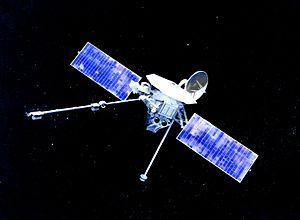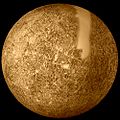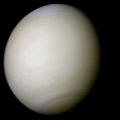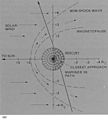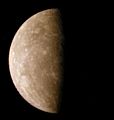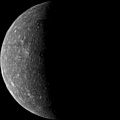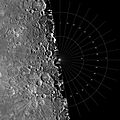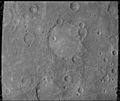Mariner 10 facts for kids
Mariner 10 was a NASA space probe that flew without a crew. It was launched on November 3, 1973. Its main job was to fly past the planets Mercury and Venus. Mariner 10 was the very first spacecraft ever sent to Mercury. It made three close passes by Mercury and took many pictures. Today, Mariner 10 is no longer working, but it is still orbiting the Sun. It was the last spacecraft in the Mariner program.
Contents
The Mission of Mariner 10
Mariner 10 was built to explore the inner solar system. Its main goals were to study Mercury and Venus up close. Scientists wanted to learn more about these planets. They hoped to understand their atmospheres, surfaces, and magnetic fields.
Journey to Venus and Mercury
Mariner 10 started its journey by heading towards Venus. On February 5, 1974, it flew past Venus. This flyby was very important because it was the first time a spacecraft used a "gravity assist". This means it used Venus's gravity to change its speed and direction. This helped Mariner 10 get to Mercury.
After leaving Venus, Mariner 10 headed for Mercury. It flew past Mercury three times:
- The first flyby was on March 29, 1974.
- The second was on September 21, 1974.
- The third and final flyby happened on March 16, 1975.
What Mariner 10 Discovered
Mariner 10 sent back amazing information and pictures. It mapped about 45% of Mercury's surface. Before Mariner 10, we knew very little about Mercury.
Here are some key discoveries:
- Mercury's Surface: The pictures showed that Mercury's surface looks a lot like the Moon. It has many craters, which are bowl-shaped holes made by impacts from space rocks.
- Mercury's Atmosphere: Mariner 10 found that Mercury has a very thin atmosphere. It's so thin that it's almost a vacuum.
- Mercury's Magnetic Field: One of the biggest surprises was finding that Mercury has its own magnetic field. This was unexpected for such a small planet.
End of the Mission
After its third pass by Mercury, Mariner 10 ran out of fuel. It could no longer control its direction. On March 24, 1975, NASA turned off its radio transmitter. The mission officially ended. Even though it's not working, Mariner 10 is still orbiting the Sun today. It's a silent reminder of a very successful mission.
Images for kids
-
An artists' impression of the Mariner 10 mission. The first mission to perform an interplanetary gravity assist, it used a flyby of the planet Venus in order to decrease its perihelion. This would allow the spacecraft to meet Mercury on three occasions in 1974 and 1975.
-
Mariner 10 space probe stamp, issue of 1975
-
Mercury in false-color
See also
 In Spanish: Mariner 10 para niños
In Spanish: Mariner 10 para niños


